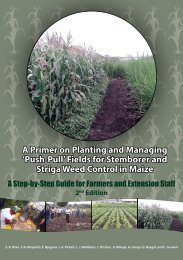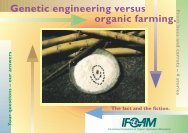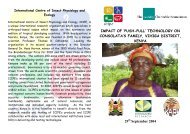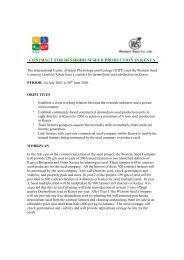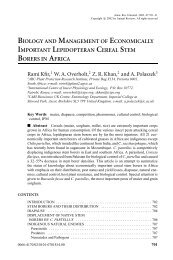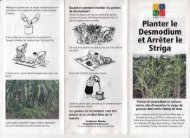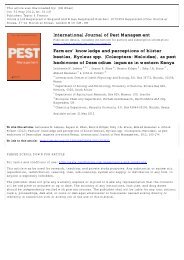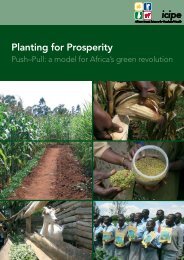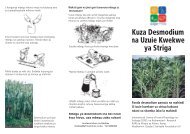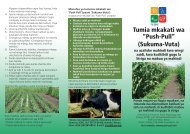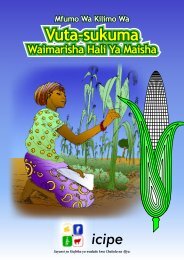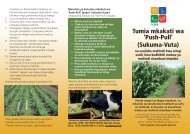The Royal Society Report - Push-Pull
The Royal Society Report - Push-Pull
The Royal Society Report - Push-Pull
You also want an ePaper? Increase the reach of your titles
YUMPU automatically turns print PDFs into web optimized ePapers that Google loves.
Recommendations<br />
1. Research Councils UK (RCUK) should develop a cross-council ‘grand challenge’ on global food crop security as a<br />
priority. This needs to secure at least £2 billion over 10 years to make a substantial difference. We believe this will<br />
require between £50 and £100 million per year of new government money in addition to existing research<br />
spending. This long-term UK programme should bring together all research councils, the Technology Strategy<br />
Board and key central government research funders (DFID and DEFRA) and be aligned with comparable<br />
international activities in this area. It should be informed by dialogue with farmers, other stakeholders and members<br />
of the public. <strong>The</strong> following recommendations justify allocation of these funds to excellent and relevant research,<br />
research training and technology transfer.<br />
2. UK research funders should support public sector crop breeding and genomics programmes to understand,<br />
preserve and enhance the germplasm of priority crops and train the next generation of plant breeders. International<br />
programmes in collaboration with Consultative Group on International Agricultural Research (CGIAR) centres and<br />
others in Africa and India should include millet, sorghum and rice. <strong>The</strong> top UK priority should be wheat, followed by<br />
barley, oil seed rape, potato, vegetable brassicas and other horticultural crops. Public sector support for breeding<br />
needs to emphasise longer term strategic approaches than can be expected from the private sector and develop<br />
traits from public sector research.<br />
3. RCUK should increase support for ecosystem-based approaches, agronomy and the related sciences that underpin<br />
improved crop and soil management.<br />
4. RCUK, and BBSRC in particular, should support long-term high-risk approaches to high-return targets in genetic<br />
improvement of crops. <strong>The</strong>se targets include GM crops with improved photosynthetic efficiency or nitrogen<br />
fixation. High risk approaches might also produce GM or conventionally bred crops with reduced environmental<br />
impact because they need lower fertiliser input or could be grown as perennials. Research into conventional<br />
breeding and GM approaches to increased yield and resistance to stress and disease should also continue to<br />
be funded.<br />
5. Universities should work with funding bodies to reverse the decline in subjects relevant to a sustainable<br />
intensification of food crop production, such as agronomy, plant physiology, pathology and general botany, soil<br />
science, environmental microbiology, weed science and entomology. We recommend that attempts by universities<br />
and funding bodies to address this skills gap look globally. Studentships and postdoctoral research positions should<br />
provide targeted subsidies to scientists in developing countries to visit the UK and work with UK researchers.<br />
6. In order to sustain research capacity and maximise the potential for research to be utilised, crop science research<br />
funded by BBSRC, DFID and others, together or separately, should have regular calls for proposals rather than oneoff<br />
grant rounds. Grants awarded in phases will allow researchers to pursue successful ideas in the field or in new<br />
countries.<br />
7. DFID should work with the CGIAR institutes to develop new mechanisms for international research collaborations<br />
with emerging scientific bases such as in China, Brazil, India and South Africa. Through its support for CGIAR, DFID<br />
should work with research funders and UK scientists to strengthen collaborations with international researchers.<br />
<strong>The</strong> UK should work with other partner countries to prioritise global agricultural research within the forthcoming<br />
European Commission eighth framework Programme.<br />
8. Research that links UK science with developing countries, funded by DFID, BBSRC and others, should work with<br />
farmers and extension services in target countries to make sure that benefits are captured and made accessible to<br />
poor farmers.<br />
9. As part of the RCUK grand challenge there should be support for joint initiatives between the public sector and<br />
industry in which the explicit aim is the translation and application of previously executed basic research.<br />
10. <strong>The</strong> UK department for Business, Innovation and Skills should review relevant intellectual property systems to<br />
ensure that patenting or varietal protection of new seed varieties does not work against poverty alleviation, farmerled<br />
innovation or publicly funded research efforts.<br />
11. UK government should work with EU partner countries over the next five to ten years to develop a system of<br />
regulation for new agricultural processes and products, based on shared principles.<br />
12. DFID and DEFRA should build on the work of the Food Research Partnership to establish an independent food<br />
security advisory function. This would work openly with stakeholders to help the government put future<br />
technological options into a broad social and economic context and appraise their benefits and uncertainties<br />
alongside alternatives. It would feed into and stimulate similar international efforts at CGIAR and UN level.<br />
x I October 2009 I Reaping the Benefits<br />
<strong>The</strong> <strong>Royal</strong> <strong>Society</strong>



